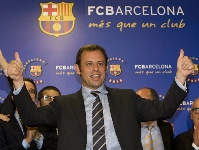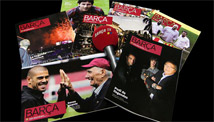FCBARCELONA.CAT
Main menu

Content menu
Club
04.07.2010 11:13
Presidents with Barça in their blood
Manel Tomàs
New Barça president, Sandro Rosell, is not the first member of his family to serve the Club. His father, Jaume Rosell, was chief executive from 1975 to 1978. But he’s not the only example of presidents with Barça in their DNA.
Jaume Rosell was appointed chief executive in July 1975, when Sandro was eleven years old and had already been a member for five years. The Rosell household was a hotbed of support for Barça – younger brother Sergi was also a member and their father had been a faithful fan since the days of the old Les Corts stadium.
Difficult times
Jaume Rosell became the chief executive of the Club at a difficult time. The dictatorship of General Franco was on its last legs and the entire Spanish state was in social and political turmoil. Jaume Rosell’s position was crystal clear. “Barça is more than a club, but above all it’s a club for all social classes. Barça includes all ideologies because it represents the whole Catalan people”.
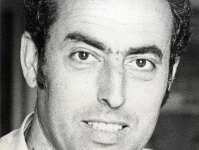 In May 1978, just before he left the post, he said: “Our Club is liberal,
pluralist and democratic. During the dictatorship, Barça was a substitute for other institutions
that were banned but I hope that never has to happen again. But if, unfortunately, it did happen
again, FC Barcelona would take on that task again”.
In May 1978, just before he left the post, he said: “Our Club is liberal,
pluralist and democratic. During the dictatorship, Barça was a substitute for other institutions
that were banned but I hope that never has to happen again. But if, unfortunately, it did happen
again, FC Barcelona would take on that task again”.
In spite of the many difficulties, Rosell was instrumental in the commitment of the Club in the democratic normalization of the country. In August 1975, the Catalan language was heard once again over the public address system of the Camp Nou (the public use of Catalan had been banned during the dictatorship). And on 13th April 1977 the Club joined the Congress of Catalan Culture which publicly called for a Statute of Autonomy for Catalonia. After leaving his post as chief executive, Rosell took responsibilities in the sports ministry of the Generalitat (Catalan government).
Enric Llaudet, a family affair
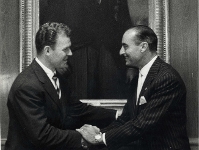 Josep Llaudet was a member of the board in the twenties, serving under
three different presidents: Gaspar Rosés (1920-21), Joan Gamper (1924-25) and Arcadi Balaguer
(1925-27). As such he experienced the first Golden Age of the Club but also witnessed some sad
episodes, such as the closure of the Club for six months due to the booing of the Spanish national
anthem in the Les Corts stadium in 1925. Meanwhile, his son Enric, born in 1916, was soaking up his
love of Barça at his side.
Josep Llaudet was a member of the board in the twenties, serving under
three different presidents: Gaspar Rosés (1920-21), Joan Gamper (1924-25) and Arcadi Balaguer
(1925-27). As such he experienced the first Golden Age of the Club but also witnessed some sad
episodes, such as the closure of the Club for six months due to the booing of the Spanish national
anthem in the Les Corts stadium in 1925. Meanwhile, his son Enric, born in 1916, was soaking up his
love of Barça at his side.
Many years later, on 7th June 1961, Enric Llaudet became president of FC Barcelona. Once again, it was a difficult time both on and off the pitch but, with the memory of his father ever present, by the time Llaudet handed over the reins in January 1968, he had stabilized the precarious finances of the Club though the results on the pitch were still far from good. He will always be remembered as a true gentleman.
The Montal dynasty
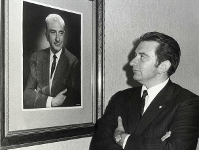 On of the greatest presidents in the history of Barça was Agustí Montal
Galobart, an industrialist of liberal and democratic persuasion. During the appalling years
following on from the Spanish Civil War and then the Second World War (1946-52) he opened the first
crack in the rigid totalitarian regime imposed by the victorious Franco dictatorship by organizing
the first post-war assembly of members in 1948. When he stepped down in 1952 Barça had just
conquered the famous Five Cups and his son Agustí, then 18, dreamed that one day he would also
become president.
On of the greatest presidents in the history of Barça was Agustí Montal
Galobart, an industrialist of liberal and democratic persuasion. During the appalling years
following on from the Spanish Civil War and then the Second World War (1946-52) he opened the first
crack in the rigid totalitarian regime imposed by the victorious Franco dictatorship by organizing
the first post-war assembly of members in 1948. When he stepped down in 1952 Barça had just
conquered the famous Five Cups and his son Agustí, then 18, dreamed that one day he would also
become president.
Agustí Montal Costa saw his dream come true on 18th December 1969. He never forgot his father’s bravery in confronting an inflexible dictatorship at a time when almost nobody dared to do so from within. He carried on his father’s work and became a leading figure in representing Barça and the Catalan people against the injustice and pro-regime policies of the Spanish footballing authorities. Montal Costa, who had the invaluable help of Club executives of the stature of Armand Carabén and Jaume Rosell, once said: “Since my infancy, the example of love and devotion towards Barça that my father gave me means that the Barça ‘feeling’ is an integral part of me”. Exactly the same as Enric Llaudet and Sandro Rosell.

